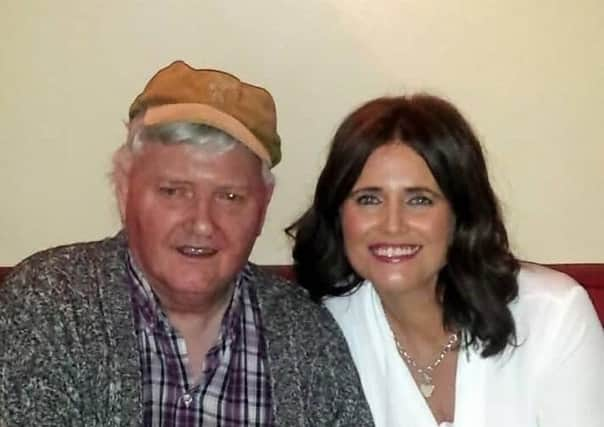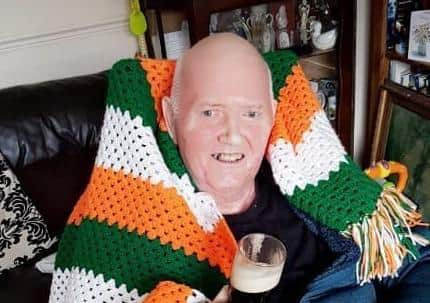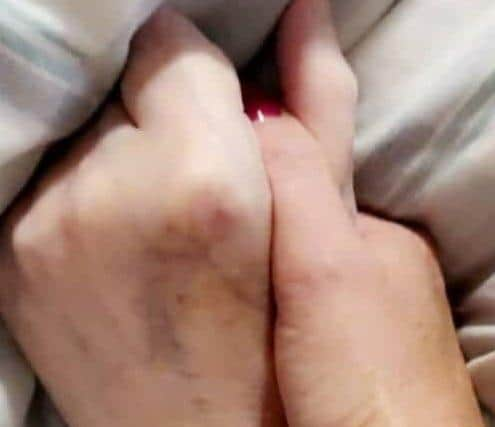Contaminated blood scandal: ‘Our brave daddy suffered all his life’


Sinead O’Sullivan (41) was speaking after the ongoing Infected Blood Inquiry heard presentations by counsel on the Belfast Haemophilia Centre and the use of a blood product called Factor 8.
The inquiry is looking at how haemophilia patients across the UK, including Northern Ireland, were treated with Hepatitis or HIV infected blood in the 1970s and 1980s.
Advertisement
Hide AdAdvertisement
Hide AdIt has been called the biggest treatment disaster in NHS history. It is understood around 100 people across the north have been affected.


One of the elements of the inquiry at the beginning of this month looked at written evidence from Dr. Elizabeth Mayne, the consultant in charge at Belfast.
It heard how she wished that none of her patients had been infected, but she remains ‘convinced that the course of action pursued by both myself and my colleagues was measured and appropriate for that time in light of the information and the state of knowledge at the time’.
Sinead’s father, Tony, was one of the people who received the infected blood at the Belfast centre and contracted Hepatitis B & C.
Advertisement
Hide AdAdvertisement
Hide AdAn inherited blood disorder, haemophilia is a life-long defect in the clotting mechanism of the blood.


Tony, who ran O’Sullivan’s Bar on Bishop Street for many years, was Ireland’s longest living haemophiliac, up until his death at the age of 80 in January this year.
Sinead, who describes herself as a ‘real daddy’s girl,’ told how her ‘kind, lovely’ father had suffered ‘all his life,’ and this was exacerbated by contracting Hepatitis through no fault of his own.
She also highlighted how there was immense stigma in society at the time over those infected with HIV and AIDs, with many of those infected described as ‘dirty.’
Advertisement
Hide AdAdvertisement
Hide AdSinead said it breaks her heart to think of how her father must have felt and how scared he must have been. She found the inquiry and its evidence, which she watched online, difficult to listen to.
“The inquiry was tough, especially as it’s so soon after daddy died. It’s still hard to believe that it happened and that people were let down so much.
“Daddy saw the best in everyone, so it’s hard then when you find out what happened to him. Factor 8 was hailed as this ‘wonder drug’ that was going to make everything better and it just made it all worse.”
Sinead outlined how, when she was growing up, her father shielded her and his family from what had happened.
Advertisement
Hide AdAdvertisement
Hide Ad“Around 13 years ago, those who were infected got some money. I was taking daddy to an appointment and he told me he was getting it and wanted to share it among the children. He said the money was for the ‘bad blood.’ I said to him: ‘I didn’t know you got that, daddy’ and he replied how he was told he was one of the lucky ones, as he got Hepatitis and not AIDs. That’s what he was led to believe, which was awful.
“At the time, he made it out to be nothing big, but it was only years later when I attended a haemophilia conference - my eldest son is also haemophiliac - that it was brought up and I realised how serious it was.”
At that stage, it was ‘too late’ to ask her father, as he had been diagnosed with dementia -something Sinead believes to have been connected to the contaminated blood.
“I asked the consultant if they believed his dementia was connected to him being infected and he said yes.’
Advertisement
Hide AdAdvertisement
Hide AdFrom looking at her father’s medical notes, Sinead found out that his liver had been showing signs of damage in the late 70s. At the inquiry last week, it was outlined how tests for Hepatitis weren’t available until the 90s.
“In daddy’s notes it says he was told around 1994 -95. He was given treatment in the mid 90s for Hepatitis C, which I know now to have been as severe as chemotherapy. He went to Belfast and did all that on his own.”
Sinead told how it must have been ‘so scary’ for her daddy to see the deaths of others who had been infected.
She is in contact with other families whose loved ones also received contaminated blood and told how their stories are ‘heartbreaking,’ with many never telling those outside their immediate family about what had happened. Due to the stigma that prevailed, the deaths of many of those who passed away were attributed to other illnesses, as they and their families didn’t want anyone to know they had received contaminated blood.
Advertisement
Hide AdAdvertisement
Hide AdIt was recently announced that the government is to set up a parliamentary review panel to examine proposals for a compensation scheme for those infected with contaminated blood.
Sinead said that while the money will be beneficial for many - particularly due to the fact those infected cannot get health insurance - ‘no amount they give us will change what happened to daddy.’
Sinead said her ‘whole life’ revolved around caring for her daddy over the past 18 years and she saw how he suffered. He frequently attended hospital, with symptoms of both haemophilia and Hepatitis B & C.
Despite his health struggles, Tony never complained and faced it with bravery and tenacity.
Advertisement
Hide AdAdvertisement
Hide AdHe opened the pub, O’Sullivan’s when he was just 25 years old and was a friendly and familiar face to many. As his health deteriorated, he leased the pub out, but never sold it. It is now back in the family and being run by his son. “I know a lot of people think I’m fortunate to have had him to the age he was but his whole life was suffering. I was the biggest daddy’s girl. He was my best friend, my mentor, my hero and honestly, the most inspirational, bravest man I’ve ever known.
“For all my life, daddy was sick. I never had a higgyback from daddy. He missed so many family occasions due to illness, but he was still the most supportive, caring champion of the underdog.”
But, said Sinead, her father never felt that he was the underdog, he felt ‘lucky and always appreciated and loved life.’ “He loved his family and was so proud of us all. He loved the craic and would have given anyone his last penny. The doctors called him a medical miracle and used to say to us we should be really proud of him.”
“His smile was infectious and anyone who met him, loved him. When he passed away his haematology doctor sent the loveliest message about the impact daddy had on him. He never, ever wished for money or anything materialistic. He always just wished to be able to go on long walks, that’s all he ever wanted. We all loved him dearly.”
Advertisement
Hide AdAdvertisement
Hide AdSinead told how she had never known her daddy to be healthy and he deserved ‘so much more.’
“He was let down by those he put all his faith and trust in, but he never felt any anger towards them.”
She continued: “He always had the best outlook on life and was always smiling, no matter what. I remember him being in hospital and I asked him: ‘Do you never get fed up?’ He replied: ‘Sure why would I get fed up? What would I get fed up about? His whole life was a struggle but he had such an amazing outlook. And he made you feel like you were capable of doing anything. I never met anyone who had a bad word to say about him.”
Sinead said that, now her daddy is gone, she feels she is her daddy’s ‘voice’ in a search to find answers and accountability.
Advertisement
Hide AdAdvertisement
Hide Ad“He should never have been made to feel lucky. He must have felt so scared and lonely, especially when there was such a stigma. There was never any counselling - he just had to get on with it.
“I know we were lucky as some people died in their 20s. Some people’s stories are horrific, but I can’t imagine how scary it must have been for daddy to still have to take treatment and not know what it was going to give you. About three years ago, daddy asked me to find out the truth. No-one has been held liable and I want someone to be. I want an apology. It was never and isn’t about money.” As someone with a family history of haemophilia, Sinead never wants history to be repeated. “I need to know something like this can never happen again. This was the biggest atrocity to hit the NHS and there are people who still don’t know about it. It wasn’t a dirty secret and it wasn’t the patients’ fault.”
Follow the inquiry at https://www.infectedbloodinquiry.org.uk/